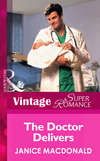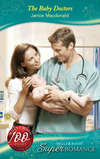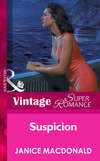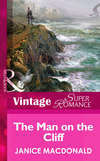Читать книгу: «The Doctor Delivers»
“I need an attractive unmarried doctor.”
Catherine Prentice looked him straight in the eye. “Don’t worry, it’s not for me. It’s for the hospital. We need you to be on the show Professional Match. All you have to do is answer a few questions and get in a plug for Western Memorial.”
“No, thanks.” Martin rose and walked round the desk, signaling—he hoped—that the matter was closed. “I don't watch TV. I'm really busy and—”
“And?”
“And to be honest…” He hesitated, then decided to let her have it. “I think this sort of thing…this puffery…is ridiculous. Empty-minded drivel. It has no place in medicine.”
“Other than that, though,” she said with a straight face, “you kind of like it?”
Martin resisted the urge to soften what he'd said with a joke or a crack; even to his own ears he'd sounded self-righteous. But he had more important concerns. “I don't have time for this.”
She turned to leave, then took a step back into the office. “Since you don't watch TV, you probably read a lot. I was just thinking there’s a character in Dickens’s A Christmas Carol you’d probably recognize.” A tight little smile, a flutter of her fingers and she was gone.
Dear Reader,
Martin and Catherine and the other characters in this book have been a part of my life for so long, it's incredibly exciting to have the opportunity to introduce them to a wider audience.
If all fiction is a little bit autobiographical, it's certainly true in this case. Although I've lived in California for many years, I'm originally from Great Britain and, like Martin, have never quite got used to eighty-degree weather at Christmas—or fake frost on the windows. I also share some common bonds with Catherine, including the struggle to raise two children as a single parent. For many years I worked in the public relations department of a large medical center, and more recently have written extensively about neonatal intensive care units for a number of publications, including the Los Angeles Times.
The specialized world of the NICU and the dedication of those who work in it never fails to impress me. But while modern medicine is responsible for breathtaking advances, it can also raise difficult and complex questions for which there are no easy answers. This was the inspiration for my story. I hope you enjoy it.
Janice Macdonald
The Doctor Delivers
Janice MacDonald
To my Mum,
who is nothing at all like Catherine’s mom and who never stopped telling me she believed in me. And to Joe, who had to endure me talking about Martin in my sleep.
Thanks for all your support.
CONTENTS
CHAPTER ONE
CHAPTER TWO
CHAPTER THREE
CHAPTER FOUR
CHAPTER FIVE
CHAPTER SIX
CHAPTER SEVEN
CHAPTER EIGHT
CHAPTER NINE
CHAPTER TEN
CHAPTER ELEVEN
CHAPTER TWELVE
CHAPTER THIRTEEN
CHAPTER FOURTEEN
CHAPTER FIFTEEN
CHAPTER SIXTEEN
CHAPTER SEVENTEEN
CHAPTER EIGHTEEN
CHAPTER NINETEEN
CHAPTER TWENTY
CHAPTER ONE
PHONE CRADLED between her head and shoulder, Catherine Prentice padded around the kitchen in a ratty yellow robe and thick woolen socks listening to her mother ramble on about colon irrigation. Her mother, who had never met a disease she couldn’t make her own, or self-medicate with the latest wonder cure.
Through the window, Catherine could see out into the small backyard. The grass needed cutting and Santa Ana winds had tossed purple bougainvillea blossoms over the rippling turquoise waters of the swimming pool, a picturesque effect marred by the floating aluminum chair and a double page of the Los Angeles Times sports section.
She dumped oatmeal into the saucepan for the children’s breakfast. On the phone, her mother moved on to St. John’s Wort and how it had really helped the woman downstairs and maybe she’d try it herself if Wal-Mart had it on sale. Sounds from the living room suggested that her ten-year-old son and his six-year-old sister were engaged in mortal combat. Catherine yelled for a cease-fire. Who ordered this day? Make it go away. I had something different in mind. Something wild and exotic. The yellow, happy face clock on the kitchen wall told her it wasn’t even seven. She had an insane urge to go back to bed and stick her head under the blankets. She was trying to imagine actually doing this when, in a blur of sound and movement, the children burst into the kitchen.
“Listen, Mom…” Catherine cut short her mother’s description of the heartburn that had plagued her since the previous evening’s spaghetti dinner, promised to call later and hung up the phone. “Okay, you guys.” She regarded her children. “What’s going on?”
“Make Julie quit sticking her feet in my face, Mom.” Peter, small for ten, his face dominated by large glasses, glared at his sister whose halo of blond curls and wide blue eyes gave her a deceptively angelic look. Peter’s breathing had an asthmatic rattle and his chest heaved slightly with each intake. “She knows it makes me mad and she keeps doing it.”
“I’m not sticking my feet in his face.” Julie kicked her pajama-clad leg high and stuck a small pink foot in Peter’s face. “I’m airing them out.”
“You need to, they stink,” Peter said.
“They do not.” Julie stuck out her tongue. “Yours stink. Yours stink worse than anything else in the world. They stink like two hundred million skunks.”
“Peter, you need to use your inhaler. And then go pick up your homework from the bedroom floor. Julie—” Catherine pointed the wooden spoon she’d been using to stir the oatmeal “—you go get dressed before breakfast. Go on. Move it, I have to be at work early today.”
On the stove, she caught the oatmeal just as it was about to erupt over the edge of the pan. She turned down the burner, then reached into the cabinet for brown sugar. Absently, she watched it dissolve into the oatmeal, her thoughts already on the day ahead. In her office at Western Memorial, where she worked in the public relations department, there were news releases waiting to be proofed, a half-finished newsletter article and a reminder that she still needed to track down the elusive Dr. Connaughton.
She’d promised the producer of Professional Match that Connaughton would be happy to appear on tomorrow’s show, but Connaughton hadn’t answered any of her pages and when she’d gone up to the NICU to track him down, he’d been with a patient’s family.
“Mommy.” Julie tugged at the belt of her robe. “I have to tell you something. Peter keeps calling me a geek.”
“Ignore him, sweetie. Please go get dressed, okay?” Maybe she’d goofed by promising Connaughton’s participation. The show was fluff, a sort of career-oriented version of Love Connection, but her friend Darcy watched it every week and, according to marketing, it had exactly the demographics Western was targeting. Personnel had given her the names of three unmarried physicians. Two of them, thrilled to be chosen, had already taped segments. Now she had to find Connaughton.
The phone rang again. “Mom, I said I’d call you. I’m trying to get the kids off to school…what? Mom, listen to me, okay? Unless you have a prostate you didn’t tell me about, Saw Palmetto isn’t going to help you. I’ve got to go, okay? I’ll call you tonight to see how you’re feeling. Yeah, I love you, too. Bye.” God. She rubbed at the knot of tension that seemed to have taken up permanent residence in the back of her neck. “Okay, kidaroonies,” she called. “Who’s ready for yummy oatmeal?”
“I’m not hungry,” Peter said.
“I don’t want oatmeal,” Julie said. “I hate oatmeal. I want eggs.”
“You had eggs yesterday. Today’s oatmeal day.”
“Nah hah. It’s Wednesday.” Julie cackled at her joke. “It’s not oatmeal day Mommy, it’s Wednesday.”
Catherine turned from the stove to smile at her daughter. A little girl in a Big Bird nightie and a gap where just two days ago she’d lost the first of her baby teeth. God, it had to get easier than this. Thinking about work when she was home with the kids, thinking about the kids when she should be focused on work. Wanting to be there for everyone, but never quite being there for anyone. Peter, still in his pajamas, hadn’t touched his oatmeal.
“Peter, eat your breakfast and get dressed. And please use your inhaler. I can hear you wheezing.” She made a mental note to call his allergist when she got to work. Call the allergist then go find Connaughton. A niggling feeling told her he might be difficult. He was new on staff and Catherine had never met him, but a nurse on the unit had rolled her eyes at the mention of his name.
“How come we never have the kind of cereal I like?” Julie asked, scowling at her bowl of oatmeal. “I like the kind of cereal Nadia gets. Nadia gets good cereal. Nadia lets us have Little Debbies for breakfast.”
Nadia. Catherine held her breath and counted to ten. Slowly. Nadia—her onetime best friend and, as of a month ago, her ex-husband’s new wife. Just hearing Nadia’s name was enough to ruin Catherine’s day. Sometimes she entertained herself by picturing Nadia ballooned up to two hundred and twenty pounds with a bad case of cellulite. Nadia could eat a case of Little Debbies and never gain an ounce. To hell with Nadia. She didn’t want to think about Nadia. “Okay, guys, let’s get this show on the road.” Arms folded, she looked at Julie. “If you’re finished, go get dressed.”
“I want some juice. Please.” Julie grinned. “See, I said please.”
“I noticed that,” Catherine poured apple juice into a Big Bird glass. Her daughter was a big Big Bird fan. “That’s very good.” As she dropped a kiss on the top of Julie’s head, she heard Peter’s asthmatic rattle, louder now. She watched him for a moment. Never a robust child, his drawn face and laboring chest reflected the effort of each breath. “Not feeling so good, huh? Where’s your puffer?”
He shrugged, and she pulled a pale blue inhaler from the cabinet drawer and waited while he used it. She had them stashed everywhere. Without intervention, mild wheezing had a frightening way of developing into a full-fledged attack. Like the last time he’d stayed at his father’s. She’d blamed the rain and the dog Gary had bought—even though he knew Peter was allergic to dogs. Gary had blamed her for upsetting Peter by making a big deal about a missing homework assignment. And forgetting to pack an extra inhaler. Which she was absolutely certain she’d done. But Gary, a trial attorney, was a master at verbal self-defence…and attack. She glanced at the clock and wondered whether she should try and make an appointment for Peter this morning and risk going into work late again.
“Daddy said Peter wheezes because you don’t dust enough.” Julie had returned to the kitchen after dressing herself in the clothes Catherine had set out the night before. Yellow leggings and a bright red woolen sweater. “Daddy said Nadia likes to clean house because it’s good for Peter’s asthma.”
Catherine opened her mouth to speak. Closed it. Let it go. She saw with relief that the inhaler was working. Peter’s breathing looked less labored, the wheeze not so audible. She poured more juice for both kids, stuck a piece of bread in the toaster for her own breakfast. Doesn’t dust enough. The words branded into her brain. Maybe Daddy should keep his lame-brained opinions to himself. Okay, she had to let it go. She spent far too much time obsessing over what an incredible jerk Gary could be. She spread a smear of peanut butter on the toast and resisted the urge to dip the spoon into the jar for a soothing mouthful.
“Daddy said he’s the luckiest man in the world to have Nadia.” Julie’s legs dangled from the chair. “I like Nadia, she’s pretty.”
Catherine looked at the spoon in her hand, still poised over the open peanut butter jar. She is only six, she reminded herself. She isn’t trying to hurt you. You can kill Gary later. Nadia too, just on general principle. Angry, she dug the spoon into the peanut butter, brought it to her mouth. And didn’t taste a damn thing. Which further incensed her.
“Daddy said when we come to live with him and Nadia, I can pick my own bedroom in the new house,” Julie said. “And I’m going to get twin beds so if you get lonely you can come and sleep in my room.”
Catherine slowly replaced the lid. “If I get lonely?”
“When we go to live with Daddy.”
“Jeez, Julie, you’re so lame.” Peter reached across the table to push her shoulder. “Dad told you not to say anything.”
“Owww,” Julie squealed. “Peter pushed me, Mommy.”
THE DAY CONTINUED on a steady downhill drift. In the office, Catherine discovered a stack of news releases that should have gone out yesterday, managed to spill a cup of coffee over the top one and splash it down the front of her cream wool skirt. And Martin Connaughton continued to play hard to get. At noon, on her way down to the lobby to meet her boss, she paid another visit to the unit.
As she pushed open the double doors to the NICU, a rush of green scrub-suited figures flew past her wheeling a Plexiglas case. She watched as they pushed it to an empty spot in the row of bassinets, watched as a nurse reached inside and lifted out a red, wizened baby, watched, transfixed, as the nurse applied sensors to the baby’s skin then threaded a tube into its tiny mouth. And then she couldn’t watch anymore. Heart racing, she turned away and stared hard at a bunch of pink Mylar balloons, but they dissolved in a blur of tears.
Peter had spent six weeks in an NICU. Even ten years later, she could vividly recall it all. The hot lights and machinery, the alarms that shrieked like police sirens when babies forgot to breathe, the nurses sitting vigil. Frantic suddenly to be somewhere else, Catherine hurried to the nurses’ station and forced herself to smile at the clerk behind the desk.
“I’m looking for Dr. Connaughton,” she said. “Is he around?”
“He was a while ago.” The clerk had white-blond hair and burgundy lips. Half a dozen small gold earrings ran up the side of her left ear. She peered out at the rows of bassinets, shrugged. “I don’t see him now. Did you try paging him?”
“Three times.”
“And he didn’t answer.” She smiled knowingly. “Yeah, well, he’s kind of famous for ignoring pages. That and being late for everything. It drives Dr. Grossman up the wall. They don’t get along,” she whispered. “At all.”
The knowledge didn’t do much for Catherine’s mood, nor did the fact that she was now five minutes late to meet her boss. Breathless from running down five flights of stairs, she pushed her way through the crowd of visitors and employees in the lobby. She found Derek in front of a makeshift stage watching Western’s employee choir singing “Winter Wonderland” under a canopy of stylized snowflakes. He wore a leather bomber jacket opened to show a pale cream shirt, a lavender tie patterned with mathematical equations and an expression of barely concealed impatience.
“You’re late.” He handed her a paper cup. “Libations. Hot apple cider, I think. Courtesy of the auxiliary. Too bad it’s nonalcoholic.”
Catherine smiled, not sure how to respond. Derek Petrelli was a puzzle she hadn’t quite solved. While administration clearly respected his ability to court the media, he made a virtual art form of flouting convention. Flamboyant and openly gay, he either behaved as though things were too tedious to endure or, for no apparent reason, turned almost childishly manic. She suspected that he saw her as a suburban hausfrau forced back into the workplace and easily shockable. Which was, in fact, pretty close to the truth.
“How are you doing with Professional Match?” he asked during a break in the choir’s offerings. Have you found anyone yet?”
“I’m still trying to reach Connaughton. That’s why I was late. I went up to the unit to see if I could find him. He hasn’t answered any of my pages.”
“Connaughton.” Amusement played across Derek’s face. “Uh-oh.”
“What?”
“I didn’t know that was who you’d lined up.”
“Personnel gave me his name. You don’t think he’s right for the show?”
Derek shrugged. “He’s telegenic enough and he has an accent of some sort, Irish, I think. A little detached and aloof at times, but he’s got that brooding quality women go gaga for. Supposedly, he and Valerie Webb are an item.”
“Valerie Webb? The pediatrician?” Catherine stared at Derek. “She’s Julie’s doctor.”
He grinned. “News flash. Physicians have sex lives.”
“I realize that, Derek…” She felt blood rush to her face. God, who ordered this day anyway? “Anyway, about Connaughton,” she said after a moment. “I told the producer he’d do the show. You think—”
“I think it might have been prudent to wait until you’d cleared it with Connaughton.” Derek paused to sip his cider. “The man is not exactly easy to work with. Either he’ll withdraw so you think you’re talking to the wall, or fly into a rage. When I had to turn down his request for publicity for that drug addict program he runs…” He rolled his eyes. “It wasn’t pretty. I didn’t dare tell him the thing is deader than a dodo. Of course, you didn’t hear that from me.”
Catherine sipped the cider. “Of course not.”
“Let me try and explain Connaughton.” Derek brought the rim of his paper cup to his lips, thought for a minute. “He’s a cowboy. A thorn in administration’s side. Never met a rule he couldn’t break. A brilliant doctor, which is one of the reasons they haven’t booted him out, but something of a law unto himself.”
Catherine felt the day slip down another notch. This time a year ago, the most complicated thing she’d had on her mind had been Christmas shopping and what kind of cookies to bake for the PTA bake sale. Now she was dealing with outlaw doctors and contemplating custody battles. Her left temple throbbed.
“But don’t let him intimidate you,” Petrelli said. “Professional Match is the most popular morning show in this area and it reaches the audience we want. Getting Connaughton on would be worth God knows how much in advertising. Be firm with him. I’d do it myself, but I’ve got a meeting downtown.”
“And if he does refuse?” She thought of the unanswered calls she’d made to the unit. “Should I try to line up someone else?”
“Connaughton’s too tough for you to handle?”
“No, I didn’t mean that.” The paper cup had started to crumple, and she tossed it in the trash. “I just meant—”
“You’ve been with Western for how long? Two months?”
“Nearly three.”
“Still on probation though.”
“Well, yes.” Her stomach did its familiar flip-flop thing. “I, uh…is there a problem?”
“Mmm.” Derek examined the paper cup he held as if it were an object of great interest. “Well, that’s the whole theory behind probation, isn’t it?” He turned the cup, peered inside, inspected the pattern of holly berries around the rim. “Wait and see how things go. Ask me in a couple of weeks. Meanwhile, work on getting Connaughton for Professional Match.” He drained the contents and smiled up at her. “Imagine your job riding on it. That should get the adrenaline flowing.”
DR. MARTIN CONNAUGHTON leaned his head back against the seat of his battered black Fiat and closed his eyes. He’d had to get out of NICU before he lost it. An hour earlier, the Washington baby had died, and one of the residents had said it was probably a good thing.
“Some make it. Others don’t,” the resident had said. “I never really believed that kid was salvageable though.”
Martin listened to the dry rustle of Santa Ana winds in the eucalyptus trees, smelled the heated air through the car’s rolled-down windows. He hated the word salvageable and had yelled at the resident for using it, but he couldn’t mourn Kenesha Washington’s death. What haunted him was her short cruel life.
After a moment, he opened his eyes. Through the windshield, he watched the pink and white blossoms on the oleander bushes tremble in the wind. A strip of eucalyptus bark whipped across his line of vision. In the arid air, his eyes and mouth felt parched, the skin on his face dry and stretched taut across his skull.
One of the E.R. physicians claimed that the number of attempted suicides rose when the Santa Ana winds blew. Martin believed it. He was from Northern Ireland, more accustomed to enveloping mists and soft rain. California’s hot, roaring winds with their banshee-like howls seemed sinister, full of dangerous energy. They made him tense and edgy, as if he’d offended a malevolent presence who would soon exact revenge.
He ran his finger under his collar—unsettled by the Santa Anas, by thoughts of Kenesha Washington and by the knowledge that today marked the fifth anniversary of his wife’s death. Five years. Enough time that it was no longer Sharon he really mourned, but what had happened to his own life in the years since her death. Somehow it had drifted so far off course that he’d started to wonder about the direction in which it now seemed headed.
In the next week, he had to make a decision. A medical team, leaving to set up a pediatric hospital in Ethiopia, had invited him to join. It was a two-year commitment, similar to other expeditions in which he’d participated, with doctors he knew and respected, yet for some reason, he couldn’t commit.
“But we were counting on you,” the group’s leader said when Martin had asked for more time to decide. “Most of us have family considerations, mortgages, all that stuff. We’re not as footloose and free to wander as you are.” He’d laughed. “Don’t tell me, you’ve settled down.”
Martin had laughed too, but the laughter was hollow. He could leave without creating a ripple. At thirty-eight, he had few possessions. The Fiat, the sloop he lived on in the Long Beach Marina, some books and an eclectic collection of music that leaned toward Celtic traditional. Back in Belfast, his family, or what remained of it—was far removed from his life.
After a week of sleepless nights searching for reasons not to go to Ethiopia, he’d finally come up with just one. The WISH program. He ran his hand across his jaw, seldom smooth even when he took the time to shave closely, and felt the coarse stubble of his beard.
WISH was about Kenesha Washington. Kenesha, the tiny junkie. Shaking, sweating, born in need of a fix. He stared down at the medical journals that littered the Fiat’s floorboards. Kenesha, who had never seen the sun or the sky. Never known anything but the brightly lit world of the NICU and people who did painful things to her.
With a sigh, he unfurled himself from the Fiat and started across the parking lot. Wind whipped at his hair, blew gritty dust into his eyes. At the edge of the lot, he stopped at a brightly painted mobile home covered with images of pregnant women, smiling under banners that read: WISH— Women, Infants, Staying Healthy.
He unlocked the back door, climbed inside. Dust motes swam in a beam of sunlight, settled on boxes of charts and folding chairs stacked against the walls. Until a week ago, the camper had rolled through the streets and housing projects of Long Beach providing free medical services to crack-addicted mothers. Now it sat idle in the lot, the prognosis grim.
His reaction to the news that Western’s executive committee had essentially pulled the plug on WISH had prompted Edward Jordan, the hospital administrator, to suggest, once again, that Martin consider taking an anger-management course. Jordan apparently saw nothing amiss with the idea of packing the indigent off to other facilities, or with turning the vehicle into a mobile cappuccino bar.
Filled with a dull anger that demanded an outlet, Martin began sorting through manila folders in one of the packing boxes. Maybe it was him. Maybe he lacked the insight to see that two-dollar lattes were a better reflection of the up-scale image Western’s public relations department wanted to project. And maybe it really was time for him to move on.
Which he would. After he gave WISH one last chance. In a couple of hours he was scheduled to make a presentation to the executive committee. The prospect of going to them, hat in hand, galled him but if he could prevent one child from going through what Kenesha Washington had, the effect would be worthwhile.
A knock on the side of the van broke into his thoughts, and he turned to see Dora Matsushita, one of the social workers in the unit, peering through the open door.
“I thought that was you I saw loping across the parking lot.” She held up a bag of oranges. “From my tree. It’s a bribe.” She winked. “I need a few minutes of your time.”
“Ah, sure, I can always be bought with oranges.” With a grin, he bent to take the bag and help her into the van. Dora had a bit of the rebel about her, a quality he admired. When they first told him to phase out WISH, he’d ignored the injunction, rounded up a small volunteer staff and taken the van out himself. Dora had been behind the wheel. A small, spare, fiftyish woman, she was a shrewd assessor of character, as quick to set straight a muddleheaded administrator as a young father.
“I want to talk to you about this little fifteen-year-old girl,” she said.
He listened, frustration building. Twice that week he’d been warned about admitting new patients, told that one more infraction would result in his dismissal. That threat didn’t trouble him as much as the knowledge that WISH would almost certainly die without his involvement.
“I’d like to, Dora. I’m not sure I can. We’ll know later this afternoon.” He told her about the upcoming presentation. “It’s the last hope we have. I’ve got all the supporting data, all the clinical documentation—”
“Oh, Martin.” She shook her head. “Facts and figures aren’t going to do it. Show some emotion. There’s a rumor up in the unit that you’ve got two temperatures, ice cold or—”
“Boiling over.” He shrugged. “I know, I’ve heard it all. So what should I do then, break into a chorus of ‘Danny Boy’?”
“WISH is your baby.” She ignored his attempt at humor. “Your passion. No one who didn’t care would put all the effort you’ve put into it. Let it out. Let yourself feel. Show the committee how important the program is to you.”
He turned away and stared through the dusty window and out to the windswept parking lot. An image of Kenesha’s face, contorted in a silent scream, filtered through his brain. Dora might be right, but emotional expression wasn’t his specialty. He turned to look at her again, shifted uneasily under her steady gaze.
“I was just thinking,” she said after a moment. “About these girls that come through WISH. By the time we see them, they’re usually right on the edge. They can go one of two ways—completely destruct, or get their lives together and find some peace.”
She paused and in the beat of silence, he heard the distant wail of an ambulance. He rolled the manila folder into a cylinder, unrolled it, tapped it against his chin. Without moving his head, he raised his eyes up at Dora. She sat with her hands folded in her lap, her expression impassive.
“Before they can find that peace and move on, they have to drop all the baggage they came in with,” she said. “Let go of who they thought they were and what they thought they knew.” She waited a moment. “I suppose, in a sense, you might say that something old has to die for something new to be born.”
DORA’S WORDS still rang in his ears as he walked into Western’s main lobby, but the sight of all the fake snow momentarily distracted him. Piles of it, flocking the branches of a massive Christmas tree, piled in drifts upon window ledges, heaped upon the roof of the Santa’s cottage. Streamers of sunlight shone like a benediction, filling the lobby with tropical warmth. Underneath his lab coat, the scrub top stuck to his back.
Unbidden, a memory of that last Christmas in Belfast surfaced. Sharon had wanted snow, and late on Christmas Eve, the rain had turned to a sleety mix that frosted the rooftops.
A voice beside him broke into his reverie, and he turned to see a tall, green-eyed woman with a glossy plait of brown hair. She had a wide, sensuous mouth and the fresh pink complexion of a child. Something about her seemed familiar, but he couldn’t place where he might have seen her. He saw her eyes widen as she read the name embroidered above the pocket of his lab coat, but as she started to speak, the employee choir, cued by a visibly perspiring Santa, broke into a loud rendition of “Frosty the Snowman.”
His mind back on WISH, Martin started to move away, but she caught his arm. Tiny charms hung from the thin silver bracelet she wore: a baby’s rattle, a gingerbread house, children’s toys. Her nails were short and unpolished.
“Dr. Connaughton.” She brought her mouth closer to his ear to be heard above the music. “Catherine Prentice. From Public Relations. Lucky coincidence, huh? I’ve paged you a whole bunch of times, left messages up in the unit and suddenly here you are.”
“And here I am.” He looked directly into the light green eyes of Catherine Prentice from Public Relations. “Will wonders never cease?”
Her face flushed pink. Arms folded across her chest, she returned his level stare.
“Actually, you mispronounced my name.” Even as he corrected her, he wondered why it mattered. “It’s Connotun not Connaughton. There’s no accent in the middle.”
“I’ll remember that.” A flicker of a smile. “Dr. Connaughton.” This time she pronounced it correctly. “That’s an Irish province, isn’t it? Connaught?”
“It is,” he said, surprised she knew of it, “Connacht in Gaelic. It’s in the west. A bit of a barren place. Have you been there then?”
“No, but my grandfather’s from County Sligo. He used to tell me all these stories. He said Connacht was so rocky and desolate that Oliver Cromwell’s men gave prisoners the choice of death or exile there.”
Бесплатный фрагмент закончился.
Начислим
+12
Покупайте книги и получайте бонусы в Литрес, Читай-городе и Буквоеде.
Участвовать в бонусной программе


















